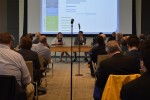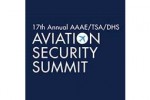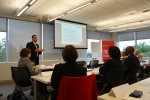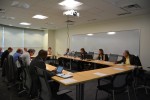News & Events
ALERT Newsletter
“ADSA in Three Words” (Video) January 29, 2018
What began as a relatively small workshop (approximately 30 attendees) on the campus of Northeastern University (Boston, MA) in 2009, has evolved into an interactive biannual conference series with over 150 participants regularly. Viewed by participants as a “forum which brings together many different communities with a common goal of solving security challenges,” (ADSA17 participant quote), the ADSA (Advanced Development for Security Applications) Workshop series intends to facilitate collaboration and innovation between these communities.
At the last ADSA workshop (ADSA17 Workshop), ALERT asked several participants to sum up the biannual event in only three words. See what government, industry, and research participants had to say in “ADSA in Three Words.”
For users without YouTube access: ADSA in Three Words
Save the Date: Upcoming ALERT Spring Events! January 29, 2018

January 29, 2018
Throughout the year, ALERT offers events that provide great networking, training, and technology opportunities to you, our center stakeholders. We hope you put the following events on your spring calendar:
ASPIRE 2018 – April 26, 2018
The Annual Student Pipeline Industry Roundtable Event (ASPIRE) will be held on Thursday, April 26, 2018 from 12:00 – 5:00pm at Northeastern University in Boston, MA. The ASPIRE series is hosted by the ALERT (Awareness and Localization of Explosives-Related Threats) and Gordon-CenSSIS (The Bernard M. Gordon Center for Subsurface Sensing and Imaging Systems). ASPIRE provides an optimal setting for dialogue among members of the academic, industrial, and government communities and also provides networking opportunities for ALERT and Gordon-CenSSIS students looking for internships, co-op opportunities, and full-time jobs.
Great for Students, Government & Industry.
Fundamentals of Explosives Course at University of Rhode Island – May 1-3, 2018
ALERT researcher, Dr. Jimmie Oxley of the University of Rhode Island, will be holding a “Fundamentals of Explosives” course for professionals working in the Homeland Security Enterprise from May 1-3, 2018, with the option of taking a “Laboratory Analysis and Safety” or “Field Instrumentation and Testing” course on May 4, 2018.
The “Fundamentals of Explosives” course examines the chemistry of explosives, the physics of detonation waves, and their initiation, and the issues involved in safe handling and characterizing these. Explosive output and coupling to surroundings with specific application to structural response will be discussed. The course will also address terrorist bombings, the gathering, analysis, and interpretation of evidence, improvised explosives, and explosives detection. Lecturers are internationally known experts. More information about the available courses and registration can be found here.
Great for Students & First Responders.
ADSA18 Workshop – May 15-16, 2018
The Eighteenth Advanced Development for Security Applications (ADSA18) Workshop will be held on May 15-16, 2018 at Northeastern University in Boston, MA. The theme of the latest ADSA workshop is “Collection and Use of Metadata for Improving Aviation Security Systems.” In addition to the discussion of metadata, presentation topics will include behavior detection, cybersecurity, and DICOS (Digital Imaging and Communications in Security) standards for airport security.
The ADSA Workshop series has been convened by the DHS Center of Excellence (COE) for Awareness and Localization of Explosives-Related Threats (ALERT) since 2009. Originally named the “Algorithm Development for Security Applications” workshop series, ALERT changed the name of the workshop series following the ADSA10 Workshop in 2014 to reflect how the scope of these workshops have expanded and evolved beyond algorithms. Today, topics addressed in these workshops include energy sources (e.g. X-ray, neutrons), sensors (e.g. photon counting X-ray detectors, trace), concept of operations, hardening, deterrence, simulants, and testing. The ADSA Workshop series is intended to address research opportunities that may enable the development of next-generation systems and to facilitate collaboration and innovation between researchers from academia, national labs, and industry.
To read the proceedings from previous ADSA Workshops, check out ALERT’s collection of final reports.
Great for Researchers, Government & Industry.
U.S. Department of Homeland Security Centers of Excellence (COE) Summit 2018 – May 30-31, 2018
The U.S. Department of Homeland Security Centers of Excellence (COE) Summit 2018 will convene from May 30-31, 2018 at George Mason University in Arlington, VA. The theme of the summit will be “University Research and Development to Protect the Homeland” and intends to bring together representatives and researchers from the current DHS COEs and their stakeholders. The goals of the summit include providing subject matter experts to discuss current and future homeland security challenges; showcasing innovative R&D tools and solutions to homeland security challenges; facilitating collaboration between DHS COEs and end users; and providing avenues to accelerate the transition of R&D to reality for those who protect the homeland. For more details and to register visit: https://cina.gmu.edu/coe-summit-2018/
Great for Students, Researchers, Government & Industry.
Advanced Development for Security Applications for Customs and Border Protection Workshop (ADSA-CBP-01)
The first Advanced Development for Security Applications for Customs and Border Protection (ADSA-CBP-01) workshop will be held on June 20-21, 2018 at Northeastern University in Boston, MA. This workshop stems from the ALERT ADSA Workshop series. The ADSA-CBP-01 workshop is convened by the Department of Homeland Security (DHS) Center of Excellence (COE) for Awareness and Localization of Explosives-Related Threats (ALERT) at Northeastern University. ALERT is supported by the DHS Science and Technology and Customs and Borders Protection Office of Field Operations through the DHS Office of University Programs.
Great for Researchers, Government & Industry.
ALERT Attends AAAE/TSA/DHS Aviation Security Summit January 29, 2018

January 29, 2018
ALERT representatives attended the 17th Annual AAAE/DHS/TSA Aviation Security Summit on December 5-6, 2017 in Arlington, Virginia. The AAAE/TSA/DHS Aviation Security Summit is an annual event, held in cooperation by the American Association of Airport Executives (AAAE), the Transportation Security Administration (TSA), and the Department of Homeland Security (DHS). The intention of the intensive day and a half conference was to bring together senior leadership from DHS and other components of the Homeland Security Enterprise, airport operators, and other key figures working in security policy and operations to review the complex issues surrounding aviation security today and to look ahead to challenges on the horizon.
The latest installment of the summit was well attended, with over 300 representatives from government, airlines, airports, and the equipment industry. The conference featured keynote speakers from the Homeland Security Enterprise, 15 exhibitors, and an engaging Airport Security Shark Tank that provided start-up companies with an opportunity to present their solutions for enhancing airport security and obtain feedback from the industry’s most valuable public and private customers. As a result of attending the summit, ALERT was able to make valuable connections with participating airlines and hopes to build meaningful collaborations on aviation security in the future.
For those who are interested, the next AAAE/DHS/TSA Aviation Security Summit will be held December 4-5, 2018 in Arlington, Virginia. The “Save the Date” and more information can be found here.
Fundamentals of Explosives Course at University of Rhode Island – May 1-3, 2018 January 29, 2018
January 29, 2018
ALERT researcher, Dr. Jimmie Oxley of the University of Rhode Island, will be holding a “Fundamentals of Explosives” course for professionals working in the Homeland Security Enterprise from May 1-3, 2018, with the option of taking a “Laboratory Analysis and Safety” or “Field Instrumentation and Testing” course on May 4, 2018.
The “Fundamentals of Explosives” course examines the chemistry of explosives, the physics of detonation waves, and their initiation, and the issues involved in safe handling and characterizing these. Explosive output and coupling to surroundings with specific application to structural response will be discussed. The course will also address terrorist bombings, the gathering, analysis, and interpretation of evidence, improvised explosives, and explosives detection. Lecturers are internationally known experts. More information about the available courses and registration can be found here.
ADSA17: Providing Solutions for Aviation Security November 27, 2017

November 27, 2017
The Seventeenth Advanced Development for Security Applications (ADSA17) Workshop convened on October 17-18, 2017 at Northeastern University in Boston, MA. Participants from academia, industry, and government gathered to engage in dialogue related to the theme of the ADSA17 Workshop: “Systems Engineering of Aviation Security Systems.” Specific topics discussed included requirement specifications for systems and subsystems; the acquisition and use of metadata; assessment, management, and use of risk; and layered security.
The ADSA17 Workshop featured more than thirty presentations from subject matter experts and leaders from industry and government over the course of two days. Presentation topics included emerging technologies, such as sensors and algorithms; aviation cargo inspection; stakeholder perspectives; behavior detection; and deep learning.
ADSA17 participants shared their views on the value of the ADSA Workshop series. ALERT Thrust R4 (Video Analytics and Signature Analysis) Leader, Professor David Castañón (Boston University) stated, “For me, as an academic researcher, the most valuable asset is getting a sense of what industry wants to address and what the government feels that its primary problems are. That helps us match what we can do with what they perceive as the big problems. I think if you ask the question for different communities that are represented here, you would get very different perspectives on the value. Some are here for the networking aspect, some are here to get educated on what other people think are the real problems that they could address and business opportunities, and others are looking for technologies. As an academician, I’m asking myself: What is the next big problem we ought to be focusing on?”
Dr. Mark Witinkski, Vice President of the Chemical Analysis & Security Group at Pendar Technologies, shared his viewpoint as an industry participant, “I go to a lot of conferences, and this doesn’t feel like one. The quality of the research and the quality of what is being presented is every bit as good as you would see at the top conferences, but it has that workshop feel where you can interact during the presentations and really discuss things after the talks and during lunch. There is ample opportunity and emphasis placed on that. We’ve formed a few really important collaborations during those times and that probably wouldn’t have happened at a traditional conference.”
The DHS Center of Excellence (COE) for Awareness and Localization of Explosives-Related Threats (ALERT) has convened the ADSA Workshop series since 2009. Originally named the “Algorithm Development for Security Applications” workshop series, the name changed in 2014 following the ADSA10 Workshop to reflect how the scope of the workshop series has expanded beyond algorithms. The purpose of the ADSA Workshop series is to address research opportunities that may enable the development of next-generation systems and to facilitate collaboration and innovation between researchers from academia, national labs, and industry.
Presentations from the ADSA17 Workshop are available for viewing online: https://alert.northeastern.edu/transitioning-technology/adsa/final-reports-and-presentations/adsa17-presentations/
Final reports for all previous ADSA Workshops are also available online: https://alert.northeastern.edu/transitioning-technology/adsa/final-reports-and-presentations/
Student Researchers Selected for ALERT Professional Development Award November 27, 2017

November 27, 2017
Three ALERT student researchers have been selected to receive the first ALERT Professional Development Award in November 2017. The winners are Qi Feng, a Ph.D. student working with Prof. Stan Sclaroff at Boston University; Ashraful Islam, a Ph.D. student working with Prof. Richard Radke at Rensselaer Polytechnic Institute; and Abubakar Siddique, a Ph.D. student working with Prof. Henry Medeiros at Marquette University.
The ALERT Professional Development Award is intended to encourage ALERT students to participate in professional development activities throughout the year and to facilitate their future participation in networking and career development opportunities. ALERT selects up to three students each year to win a $1,500 stipend that can be used towards attendance at a professional or academic conference and/or to visit and collaborate with a lab related to their ALERT research project. This year, applications were accepted August through October 2017. More information about next year’s award cycle is forthcoming.
Guardian Centers Joins ALERT, Presents at Industrial Advisory Board Meeting November 27, 2017

November 27, 2017
ALERT held its annual Industrial Advisory Board (IAB) Meeting at the Kostas Research Institute in Burlington, MA on October 16th. The agenda attracted many of ALERT’s industrial members, representatives from ALERT’s DHS Office of University Program (OUP) customers and other DHS components, such as DHS S&T, Federal Emergency Management Agency (FEMA), Customs and Border Protection (CBP), and Occupational Safety and Health Administration (OSHA). It was ALERT’S highest attended IAB Meeting to date and many new relationships were established, laying the groundwork for potential future collaboration.
The agenda included welcoming remarks from Tim Connelly, the Executive Director of the Massachusetts Technology Collaborative, presentations from two guest and one faculty presenters, a student poster session, a testimonial of successful government/faculty/industry collaboration within ALERT, and a tour of the ALERT Video Analytics Laboratory, followed by a networking reception. Presenters included:
- Guest Presenter: Thriving in the Innovation Economy through Collaborations of Government, Universities, and Industry, Gary Markovits, CEO, Innovation Business Partners, Inc.
- Guest Presenter: Guardian Centers Capabilities and Case Studies, Tim Maloney, VP, Business Development, Guardian Centers, LLC.
- Industry-Academic Team Presenter: An ALERT Case Study for Successful Collaboration and Transition, Jeff Schubert, Sr. Staff Scientist, AS&E, and Dr. Brian Tracey, Research Faculty, Tufts University, ECE.
- Research Presenter: Imaging at Speed Using a Multicoded Compressive System, Jose Martinez-Lorenzo, Assistant Professor, Mechanical and Industrial Engineering Jointly Appointed, Electrical and Computer Engineering, Northeastern University.
ALERT had the privilege of introducing the Guardian Centers, LLC as not only a guest presenter, but also our newest ALERT Industrial Member. Guardian Centers is a dynamic and immersive urban terrain campus that replicates realistic natural and man-made disasters. They provide custom services that include complete exercise design and planning, training and certification, and full-service logistics support at its state of the art flagship training campus in Perry, Georgia, or at any client location throughout the world. Guardian Centers demonstrates exceptional performance and results delivering specialized training courses and practical exercises for special skills certification and professional services training.
ALERT’s annual IAB Meeting and other members-only events provide industrial members with the opportunity to network with other members, faculty from ALERT’s partner institutions, and representatives from local, state, and federal government institutions. Other advantages of ALERT industrial membership include admission to the Annual Student Pipeline Industry Roundtable Event (ASPIRE), providing industrial members with access to qualified job-seeking students; the opportunity to request targeted research in an area of interest to their organizations; and waivers of ALERT workshop registration fees. For more advantages of ALERT industrial membership, please see the Benefits of Collaboration, or contact our Industrial and Government Liaison Officer, Ms. Emel Bulat at [email protected].
Rappaport Delivers IEEE Distinguished Lectures in Australia and New Zealand November 27, 2017

November 27, 2017
ALERT Deputy Director and Northeastern University Electrical and Computer Engineering Distinguished Professor, Carey Rappaport, delivered three IEEE Distinguished Lectures in Australia and New Zealand earlier this month. The IEEE Antennas and Propagation Society (AP-S) selected Professor Rappaport as a Distinguished Lecturer for 2017-2019. The IEEE AP-S Distinguished Lecturer Program sends experts, the Distinguished Lecturers, to visit active IEEE AP-S Chapters around the world and give talks on topics of interest and importance to the Antennas and Propagation community. Professor Rappaport gave the following talks during his recent visit to Australia and New Zealand:
- “Electromagnetic Sensing and Treatment of Living Things: Using Microwaves to Detect and Treat Disease in Humans and Trees” (Melbourne, Australia)
- “A High Gain Toroidal Reflector Antenna for Multistatic 3D Whole Body Millimeter-Wave Imaging” (Queenstown, New Zealand)
- “Multifocal Bootlace Lens Design Concepts” (Sydney, Australia)
On the value of being an IEEE Distinguished Lecturer, Professor Rappaport states, “The IEEE Distinguished Lecturer Program supports one of the fundamental precepts of academic research: extending the dissemination of knowledge and cutting-edge discovery to as wide an audience as possible. In presenting my team’s engineering work around the world, I have been able to help engineers extend their scientific awareness beyond their traditional themes, and occasionally outside their comfort zones. Although the travel commitment is time-consuming, it has been a great opportunity to meet people and exchange technical ideas.” Professor Rappaport will be delivering another IEEE Distinguished Lecture in January 2018 to the IEEE AP-S chapter in Orlando, Florida.
Professor Rappaport has been a Northeastern University faculty member since 1987, becoming a full professor in Electrical and Computer Engineering in July 2000, and receiving an appointment as a College of Engineering Distinguished Professor in 2011. Professor Rappaport has written over 400 technical journal articles and conference papers on various topics, including electromagnetic wave propagation and scattering computation, microwave antenna design, and bioelectromagnetics. He has also received two reflector antenna patents, two biomedical device patents, and four subsurface sensing device patents.
Upcoming 2017 Industrial Advisory Board Meeting September 27, 2017

ALERT is once again hosting its annual Industrial Advisory Board (IAB) meeting at the Kostas Research Institute in Burlington, MA. The October 16th event will include many of ALERT’s industrial members, representatives from ALERT’s DHS Office of University Program (OUP) customers and other DHS components, such as DHS S&T, Federal Emergency Management Agency (FEMA), and Customs and Border Protection (CBP), as well as a representative from the Occupational Safety and Health Administration (OSHA).
The agenda has evolved to include two guest speakers, a student poster session, and networking reception. Additionally, the event will include welcome remarks from Tim Connelly, the Executive Director of the Massachusetts Technology Collaborative, a faculty speaker, a testimonial of successful government/faculty/industry collaboration within ALERT, and a tour of the ALERT Video Analytics Laboratory. Presenters include:
- Guest Presenter: Thriving in the Innovation Economy through Collaborations of Government, Universities, and Industry, Gary Markovits, CEO, Innovation Business Partners, Inc.
- Guest Presenter: Guardian Centers Capabilities and Case Studies, Tim Maloney, VP, Business Development, Guardian Centers, LLC
- Industry Presenter: An ALERT Case Study for Successful Collaboration and Transition, Jeff Schubert, Sr. Staff Scientist, AS&E
- Research Presenter: Imaging at Speed Using a Multicoded Compressive System, Jose Martinez-Lorenzo, Assistant Professor, Mechanical and Industrial Engineering Jointly Appointed, Electrical and Computer Engineering, Northeastern University
ALERT’s annual IAB Meeting, and other members-only events give industrial members the opportunity to network with other members, faculty from ALERT’s partner institutions, and local, state, and federal representatives. Other advantages of ALERT industrial membership include admission to the Annual Student Pipeline Industry Roundtable Event (ASPIRE), providing industrial members with access to qualified job-seeking students; the opportunity to request targeted research in an area of interest to their organizations; and waivers of ALERT workshop registration fees. For more advantages of ALERT industrial membership, please see the Benefits of Collaboration, or contact our Industrial and Government Liaison Officer, Ms. Emel Bulat at [email protected].
Student Spotlight: Elizabeth Wig September 27, 2017

Congratulations to Elizabeth Wig, a Northeastern University (NU) Electrical Engineering undergraduate conducting ALERT research, for receiving the Society of Women Engineers GE Women’s Network Scholarship! Elizabeth will receive this award, which comes with a $5,000 stipend, in October 2017 at the SWE Annual Conference in Austin, Texas. Elizabeth has been working with ALERT R3 Thrust Leader, Professor Carey Rappaport since Summer 2016, conducting research on “Computational Models & Algorithms for Millimeter Wave Whole Body Scanning for AIT,” in collaboration with Smiths Detection (Project R3-A.2). When asked how Elizabeth got involved with the project so early on in her undergraduate career, she explained that she met Professor Rappaport at a NU-sponsored ski event and found out about his research while riding up the mountain on a chairlift. However, Elizabeth explained that her interest in this research began much earlier, “When my high school physics class did its electricity and magnetism unit, the symmetry was strikingly beautiful. I loved the way relatively few equations could describe so much of what makes up our world, from why sunrises are so beautiful to the way molecules hold together to Wi-Fi.” The aspect of her research that she is most passionate about is math, and learning about the different ways mathematics can be used to describe and explain our world. This fits in well with her role on the project, which involves developing the model used to detect and characterize potential explosives threats and eliminate false alarms using a millimeter-wave body scanner. She has been working to make and refine the model to improve the accuracy in characterization.
Beyond her recent award, Elizabeth has also published a paper on her work with Mahdiar Sadeghi, a Northeastern graduate student, and Professor Rappaport, and is currently working on her second paper. She and Mahdiar were also asked to present their work at the ADSA15 (Advanced Development for Security Applications) Workshop in November 2016.
Elizabeth has already gained valuable work experience through her Spring 2017 co-op position at Draper Laboratories in Cambridge, MA. There she worked on electrical engineering projects in their Sensors and Imaging Systems group. As for her future career, she hopes to continue her education and complete a Ph.D. program, and if possible, get the opportunity to travel more internationally and work with NASA!
